Publications

Why the gender transformative approach is critical to achieving more equitable and resilient small-scale fisheries in sub-Saharan Africa
01/04/2023
This issue brief aims to highlight the benefits of adopting the gender transformative approach (GTA) in small-scale fisheries (SSF) projects and initiatives in sub-Saharan Africa. It serves as an introduction for various stakeholders wishing to gain an initial understanding of how to embed the GTA in fisheries programming. 40 pp.
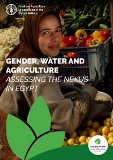
Gender, water and agriculture
01/04/2023
This assessment aims to shed light on the different contributions and benefits of women and men in relation to agricultural roles, responsibilities and resources, focusing mainly on productive agricultural resources, including water, to inform more efficient, equitable and gender-responsive programmes in the future. 72 pp.
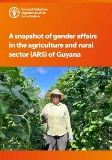
A snapshot of gender affairs in the agriculture and rural sector (ARS) of Guyana
01/04/2023
In alignment with the FAO Policy on Gender Equality 2020–2030, the Assessment describes women’s and men’s specific roles and opportunities in agriculture, and explores the impact of existing gender inequalities on both women’s empowerment and rural development. Rural women are among the main contributors to food production and food processing in Guyana yet women’s access to both productive resources and services is limited. 8 p.
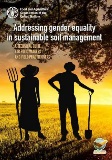
Addressing gender equality in sustainable soil management
01/04/2023
This technical guide for addressing gender equality in Sustainable Soil Management (SSM) is designed to provide an easily accessible and understandable reference on how to apply the Voluntary Guidelines on Sustainable Soil Management (VGSSM) for building healthy soils, while ensuring gender equality and women’s empowerment in all aspects of SSM. 48 p.

Engaging women and men equally in managing biodiversity
01/03/2023
This publication aims to raise gender awareness and providing guidance to FAO staff working in the field of biodiversity to help them to better identify and address the gender and social dimensions in biodiversity management. 52 pp.
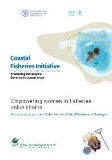
Empowering women in fisheries value chains - Good practices from Cabo Verde, Côte d’Ivoire and Senegal
01/03/2023
This fact-sheet aims to promote the dynamism of women processors of fishery products in West Africa with regards to organization, processing, commercialization and diversification aspects. 4 pp.
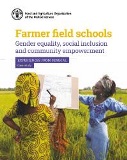
Farmer field schools, gender equality, social inclusion and community empowerment
01/03/2023
The purpose of the initiative is to make farmers’ experiences more visible, and not only demonstrate the impact of FFS programmes, but also use these experiences in future implementations of the FFS approach. 107 pp.
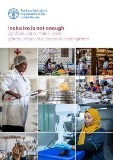
Inclusive is not enough – Agrifood value chains need gender-responsive business development
01/03/2023
This brief, jointly developed by the FAO Regional Office for Africa and the FAO Regional Office for the Near East and North Africa, aims to trigger a critical reflection on the concept of “inclusive” agribusiness and propose a new definition that highlights the importance of considering gender equality and women’s empowerment as an integral component of agribusiness development. 36 pp.
